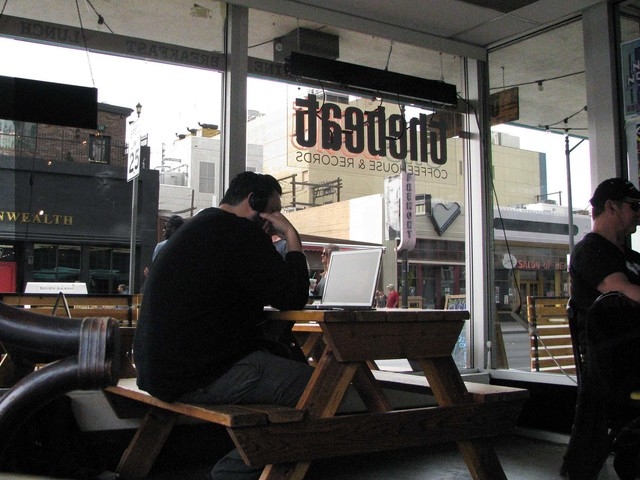Remaking the status quo: How the American dream changed for millennials

For millennials — a term that loosely defines the generation of people currently in their early 20s to mid-30s — the recession hit particularly hard and at a particularly difficult time. Many of them were just entering the job market when it went south, but a lot of them have landed on their feet.
“When I entered the market in 2007, it was pretty rough,” said Derek Noel, 30, who works at Zappos. “I think we’re in a much better place now, but I don’t know if that’s a universal experience.”
Noel works as a “Fungineer,” a Zappos-specific title that means he organizes employee events and engagement activities. When Noel started out in the workforce, he said he couldn’t find anything he was really interested in and ended up working customer service and retail jobs. He said he’s very happy at his Zappos job and isn’t looking for anything else, but he rents, in part, so he can at least feel like he’s not tied down to a physical location.
“I like being able to know that if an opportunity came up, I could go follow where the wind takes me,” Noel said. “I’m not interested in owning a home. It’s not something I need to feel successful and grounded. I like having a little sense of ‘nomadicy’; I’d like to have experiences and travel rather than make a house payment.”
He does know some other millennials for whom owning a home is a part of their dreams, but he suspects many people still have a bit of resentment and distrust following the collapse of the housing market.
Louis Delgado, who was working on prototyping an app while drinking coffee in The Beat Coffeehouse, 520 E. Fremont St., agrees that most millennials aren’t interested in home ownership.
“I can go anywhere in the world, and as long as there’s an Internet connection and power, I can work there,” Delgado said. “Why would you want to tie yourself down with a mortgage?”
Delgado grew up in Las Vegas and left for a few years to attend college in St. Louis. Eventually, he married a local woman and got a job there, but when the marriage soured and ended, he came back to his hometown where he is self-employed.
“If I had to give myself a title for a client, I’d technically be a freelance UX/UI designer,” Delgado said. “I like to think of myself as a digital products designer.”
What he doesn’t like to label himself as is a millennial, even though he is in the age range.
“I think it gives negative connotations,” he said. “I think the older generation doesn’t respect the younger generation when they hear the word. I’ve learned a lot from the older generation.”
Delgado believes the economy is doing fine and that there’s plenty of work as long as one is willing to work to find and keep it.
“I think as long as your work is good, and you can say something for yourself, speak intelligently and make a sale, you’re fine,” he said. “Vegas is a lot harder than San Francisco for what I do. Here, you have to go out, and you have to hustle a bit.”
Errol Campbell was working in construction when the recession hit. He was already beginning to shift to some self-employed work, and as the construction jobs started to go away, he transitioned into working for himself full time and discovered he was making more money.
“I work in leads and advertising,” Campbell said. “I buy and sell leads for real estate agents, lawyers and doctors. To me, it looks like the economy is recovering, but for me, it never slowed down.”
The nomadic life is not for Campbell, who owns a home downtown and is very settled in his hometown.
“I’m not leaving Las Vegas,” he said. “I was born and raised here. I love Las Vegas. It’s my home.”
To reach East Valley View reporter F. Andrew Taylor, email ataylor@viewnews.com or call 702-380-4532.